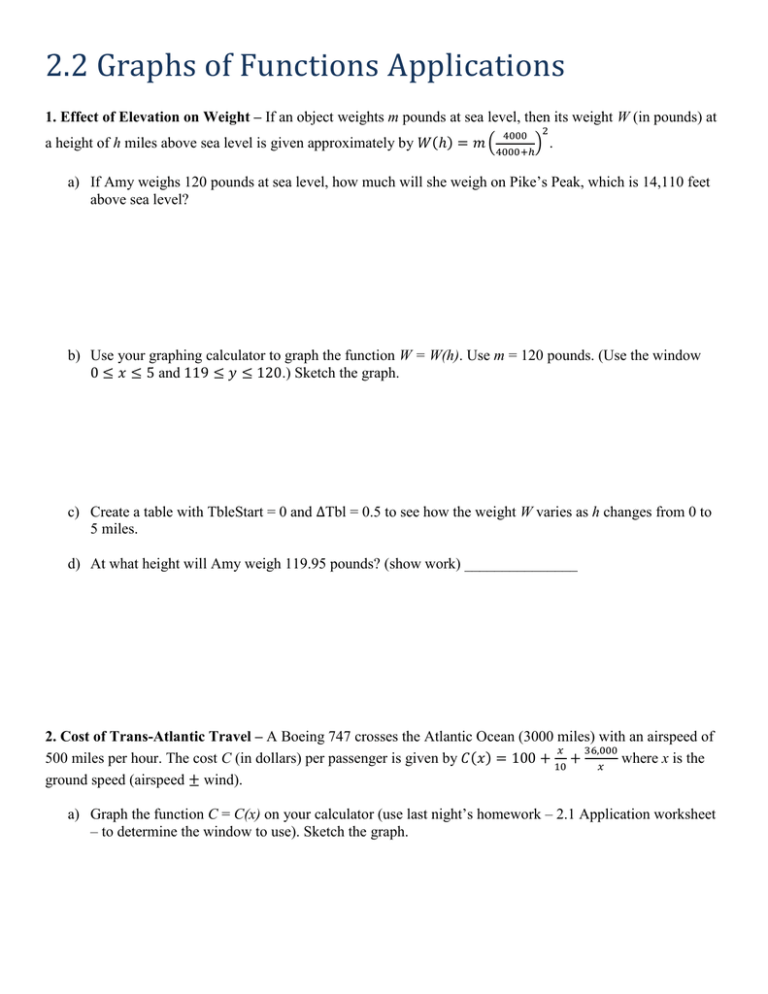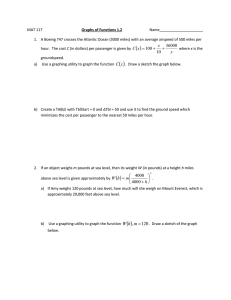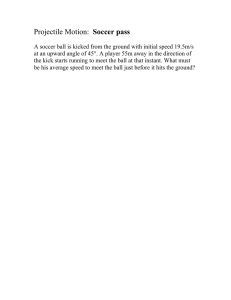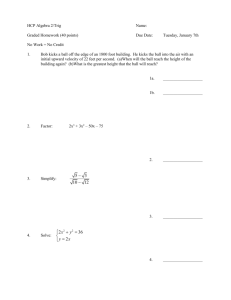2.2 Graphs of Functions Applications
advertisement

2.2 Graphs of Functions Applications 1. Effect of Elevation on Weight – If an object weights m pounds at sea level, then its weight W (in pounds) at 4000 2 a height of h miles above sea level is given approximately by 𝑊(ℎ) = 𝑚 (4000+ℎ) . a) If Amy weighs 120 pounds at sea level, how much will she weigh on Pike’s Peak, which is 14,110 feet above sea level? b) Use your graphing calculator to graph the function W = W(h). Use m = 120 pounds. (Use the window 0 ≤ 𝑥 ≤ 5 and 119 ≤ 𝑦 ≤ 120.) Sketch the graph. c) Create a table with TbleStart = 0 and ∆Tbl = 0.5 to see how the weight W varies as h changes from 0 to 5 miles. d) At what height will Amy weigh 119.95 pounds? (show work) _______________ 2. Cost of Trans-Atlantic Travel – A Boeing 747 crosses the Atlantic Ocean (3000 miles) with an airspeed of 𝑥 36,000 500 miles per hour. The cost C (in dollars) per passenger is given by 𝐶(𝑥) = 100 + 10 + 𝑥 where x is the ground speed (airspeed ± wind). a) Graph the function C = C(x) on your calculator (use last night’s homework – 2.1 Application worksheet – to determine the window to use). Sketch the graph. b) Create a TABLE with TblStart = 0 and ∆Tbl=50. c) To the nearest 50 miles per hour, what ground speed minimizes the cost per passenger? (Use the table) _____________ 3. Motion of a Golf Ball – A golf ball is hit with an initial velocity of 130 feet per second at an inclination of 45 to the horizontal. In physics, it is established that the height h of the golf ball is given by the function ℎ(𝑥) = −32𝑥 2 1302 + 𝑥 where x is the horizontal distance that the golf ball has traveled. a) What is the height of the golf ball after it has traveled 100 feet? 300 feet? 500 feet? (Show work) b) How far did the ball travel? (show work) c) Graph the function h = h(x) on your calculator (use your answers for (a) and (b) to determine the window to use). Sketch the graph. d) Use your graphing calculator to determine the distance that the ball has traveled when the height of the ball is 90 feet (use the trace button). _________________ e) Create a TABLE with TblStart = 0 and ∆Tbl = 25. To the nearest 25 feet, how far does the ball travel before it reaches a maximum height? What is the maximum height? ______________




